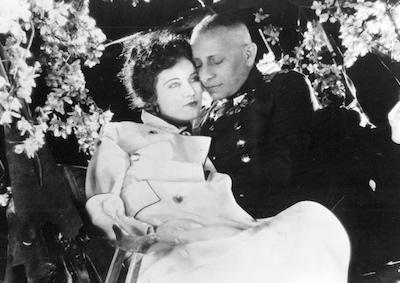The Wedding March (1928)
Live musical accompaniment by Cliff Retallick!
Prince Nicki (Erich von Stroheim) is a member of the Austro-Hungarian nobility in 1914 Vienna, a dashing cavalry officer, but his family has run out of money. He meets Mitzi (Fay Wray), a typical Viennese shop girl, during a parade and falls in love, but she is engaged to a butcher. Meanwhile, his family pressures him to marry Cecelia, the daughter of a rich factory owner who wants to purchase an aristocratic title. Erich von Stroheim was known for his uncompromising realism as a director, and that is fully visible here in the vast sets and lavish costumes of Imperial Vienna. The director shot enough material for two complete features, so Paramount released the film in two parts. Unfortunately, the only surviving print of “The Honeymoon” (Part II) was sent by James Card to Henri Langlois in Paris, who left the nitrate print in a metal shipping case in the sun in a courtyard, where it self-ignited and burned. What remains is still one of Stroheim’s most romantic films. The film was put on the National Film Registry in 2003.
DCP, b/w & two-color Technicolor, 113 min. Director: Erich von Stroheim. Screenwriter: Harry Carr, Erich von Stroheim. Cast: Fay Wray, Erich von Stroheim, Matthew Betz, Zasu Pitts, George Fawcett.
American Madness (1932)
Banker Tom Dixon, played by Walter Huston, is caught between a rock and a hard place. His Board wants him to sell the bank, after a robbery renders the bank insolvent, causing a panic among depositors. But Dixon doesn’t want to betray the depositors, many of whom are his friends. The heartless bank directors, on the other hand, are visually compared to gangsters. Director Frank Capra and screenwriter Robert Riskin’s Depression-era film tries to put a human face on the thousands of American bank failures after the stock market crash of 1929. Like so many of the Capra-Riskin collaborations, the film champions the tenets of liberal capitalist democracy and demonstrates an unshaken belief in the basic goodness of human beings. People may have called it “Capra-corn,” but it was a recipe for success in the 1930s, as Americans found hope amid despair in such messages.
DCP, b/w, 75 min. Director: Frank Capra. Screenwriter: Robert Riskin. Cast: Walter Huston, Pat O’Brien, Kay Johnson, Constance Cummings.






 Mobile Navigation
Mobile Navigation

